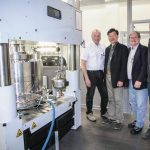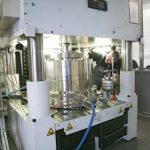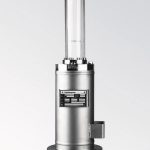In 2013, Eagle Burgmann supplied its largest agitator seal to date with a shaft diameter of 480 mm. It was destined for use at a PTA facility in China. The order from SPX Flow Technology comprised 13 agitator seals and supply systems in total. The dimensions and weight (up to 1.5 tons) of the mechanical seals needed for such large diameters set new challenges for both the seal and machine manufacturers and the installation team at the facility.
Author Kerstin Birner Strategic Market Development, Eagle Burgmann
PTA stands for Purified Terephthalic Acid. It is a preliminary product used particularly in polyester and PET production. PTA is generally manufactured from naphtha via the intermediate product paraxylene. At present, para-xylene is converted to TA (terephthalic acid) in large oxidation reactors using acetic acid as the solvent. The TA is then purified in a multi-stage crystallisation process. Any remaining impurities are removed in a hydrogenation reactor. The continually increasing demand for PTA calls for facilities with ever greater capacity (500,000 t/a) and thus ever bigger equipment like reactors and crystallisers.
The right seal design
The standard shaft sizes for these types of reactor and crystalliser are now 200 mm or larger. Eagle Burgmann’s largest shaft diameter to date was 480 mm. The dimensions and weight (up to 1.5 tons) of the mechanical seals needed for such large diameters set new challenges for both the seal and machine manufacturers and the installation team at the facility.
The difficulty with such large seals is managing deformation of the sliding faces and hence the shape of the sealing gap across the entire face. This is essential to ensure low and stable leakage and maintain a low sliding face temperature, which has a decisive influence on the service life of the seal. The optimum sealing gap geometry is determined by experts on the basis of extensive calculations and then veri-fied in test runs. Seals up to approximately 800 mm can be tested, and process conditions simulated, on Eagle Burgmann’s own test facilities. The limiting conditions there are the overall height, weight and diameter of the seal housing. Customer acceptance and other tests simulate temperature changes at the sliding faces together with leakage under almost real operating conditions. After the test run, the seal is allowed to cool down before being dismantled in the presence of the customer. The sliding faces and other components are then assessed.
The high pressures up to 50 bar and temperatures up to +270 °C are equally daunting challenges in PTA manufacturing. HSH type high pressure seals are therefore used, generally in the form of a pressurised double seal with integrated bearing. This is a balanced, self-closing seal, i.e. the seal remains closed even if the barrier pressure drops or in the event of pressure reversal. Any process medium is consequently prevented from reaching the seal. The cartridge design guarantees ease of assembly, which is particularly important given the enormous weight of the seals.
To withstand the high product temperatures, the seals have cooling flanges and housings. They are thus no longer cooled by the barrier medium, but via an external medium circulating in the flange and housing. In addition, the parts of the seals in contact with the product are made from special titanium alloys since the acetic acid used in the process is extremely corrosive. Flushing with nitrogen in front of the mechanical seal also prevents the medium from penetrating into the interior. Corrosion of product-contacting parts is reliably avoided, as is the formation of deposits on the seal.
The failure of a large PTA facility would prove to be very expensive, so the seals must offer the highest possible operational reliability. Shrink-fit sliding faces are employed for this reason. These offer better protection against broken rings and minimise the risk of disruptions. The operators of such facilities require agitator seals to remain in use for two to three years to enable the maintenance intervals to be kept short. Eagle Burgmann has demonstrated in many reference projects in countries such as Belgium, China and the USA that its seals fully meet the expectations placed on them. The seal manufacturer is meanwhile one of the leading suppliers with wide-ranging experience in the use of agitator seals for PTA manufacture.
Reliable seal operation
Seal supply systems also play a significant role in the reliability and service life of the seals. In most cases, API plan 53C is chosen. This is a system in which the barrier pressure is generated with the aid of a pressure booster. A separate cooler may be used for cooling. Circulation is ensured either using the thermosiphon principle or by forced circulation, e.g. with a pump, depending on the viscosity of the supply medium and the load on the seal. With a pressure booster, pressurisation is achieved by pistons in relation to the pressure in the sealed space. The barrier pressure is automatically adjusted to the appropriate transmission ratio (generally 1.1 or 1.5). The system is self-regulating and responds to fluctuations in the fluid pres-sure in the sealed space. This ensures that the seal operates perfectly, even when exposed to varying conditions. In addition, the ratio between the product and barrier pressures remains constant at all times, which has a positive effect on the load on the seal and thus on its service life. Moreover, the pressure booster has the advantage that it does not have to be connected to the nitrogen supply system to generate the barrier pressure.
To sum up, it can be seen that a long service life and high operational reliability of the shaft seal depend not only on the right choice of seal and materials but also on how it is operated. Provided the characteristics of the manufacturing process, properties of the chemical substances, etc. are taken into account as well, the maintenance costs can be kept low and the availability of the facility greatly increased.
cpp-net.com/0314456
Share:









